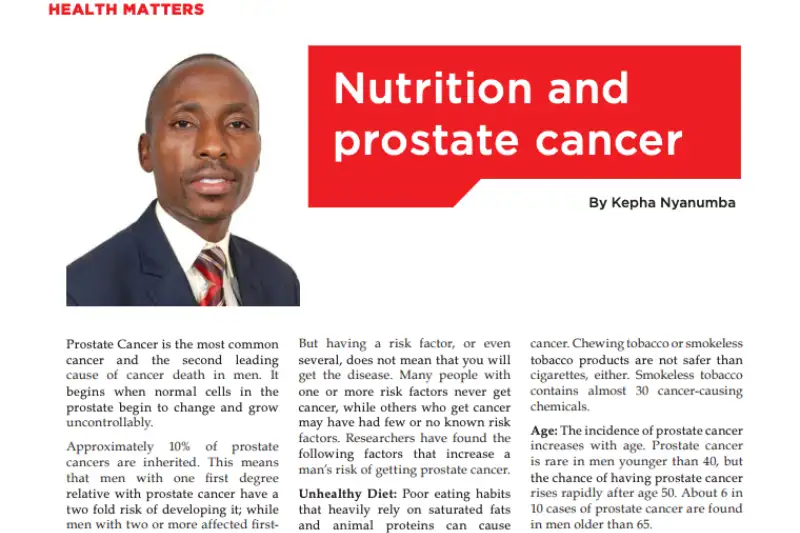Nutrition and Prostate Cancer
By Kepha Nyanumba
Prostate cancer is the most common cancer and the second leading cause of cancer death in men. It begins when normal cells in the prostate begin to change and grow uncontrollably.
Approximately 10% of prostate cancers are inherited. This means that men with one first-degree relative with prostate cancer have a twofold risk of developing it; while men with two or more affected first-degree relatives, have a 5-11-fold risk, and so forth.
In the earlier stages of the disease, prostate cancer rarely causes any specific symptoms. Later, it can present the following symptoms in the lower urinary tract: difficulty passing urine, poor flow when passing urine, incomplete emptying of the bladder, increased frequency and urgency to pass urine, excessive urination at night, and erectile dysfunction.
A locally advanced case of prostate cancer may obstruct the kidneys and cause renal failure. Prostate cancer usually spreads to the bones and may cause bone pain or fractures.
What are the Risk Factors of Prostate Cancer?
Risk factors are conditions that increase your risk of developing a disease. Risk factors are either modifiable, meaning you can take measures to change them, or non-modifiable, which means they cannot be changed.
Different cancers have different risk factors. Examples of modifiable risk factors of prostate cancer include smoking and unhealthy diet, while non-modifiable risk factors include age and family history.
But having a risk factor, or even several, does not mean that you will get the disease. Many people with one or more risk factors never get cancer, while others who get cancer may have had few or no known risk factors. Researchers have found the following factors that increase a man’s risk of getting prostate cancer:
-
Unhealthy Diet: Poor eating habits that heavily rely on saturated fats and animal proteins can cause DNA damage and lead to prostate cancer. Even men who are already at greater risk can reduce their chances of developing prostate cancer by adopting a healthy diet and lifestyle.
-
Smoking: Cigarette smoking increases the risk of prostate cancer by affecting circulating hormone levels or through exposure to carcinogens. Many people believe that smoking a cigar is safer than smoking a cigarette. But, cigar smokers face many of the same potential risks as cigarette smokers, including prostate cancer. Chewing tobacco or smokeless tobacco products are not safer than cigarettes, either. Smokeless tobacco contains almost 30 cancer-causing chemicals.
-
Age: The incidence of prostate cancer increases with age. Prostate cancer is rare in men younger than 40, but the chance of having prostate cancer rises rapidly after age 50. About 6 in 10 cases of prostate cancer are found in men older than 65.
-
Family History: Prostate cancer seems to run in some families, which suggests that in some cases there may be a genetic factor. Still, some prostate cancers occur in men without a family history of it. Having a father or brother with prostate cancer more than doubles a man’s risk of developing this disease.
-
Ethnicity: Prostate cancer develops more often in African-American men and in Caribbean men of African ancestry than in men of other races. And when it does develop in these men, they tend to be younger. Prostate cancer occurs less often in Asian-American and Hispanic men than in non-Hispanic whites.
-
Gene Changes: Several inherited gene changes (mutations) seem to raise prostate cancer risk, but they probably account for only a small percentage of cases overall.
-
Chemical Exposure: Men who are exposed to certain chemicals such as pesticides and herbicides may have higher than average rates of prostate cancer.
Early Detection of Prostate Cancer
“Prostate cancer is potentially curable when it is diagnosed early and prostate cancer is localized to the prostate gland. In the last two decades, earlier diagnosis and treatment has led to a marked decrease in fatalities caused by prostate cancer.”

